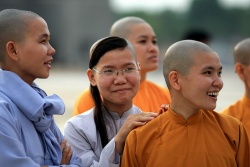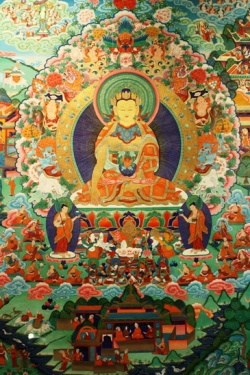The thullaccayas
The thullaccayas
There are no thullaccaya among the 227 rules of the pātimokkha.
Therefore these were not taught separately. As with many other aspects, the thullaccayas were established by the Buddha as transgressions whose gravity is just lesser than that of the pārājikas and the saṃghādisesas.
Essentially, the thullaccayas are preliminary offences that a bhikkhu may commit before a pārājika or a saṃghādisesa. The thullaccayas preliminary to the pārājikas
According to the pārājika 1, the bhikkhu who has a sexual relation by means of the mouth, the anus or the genitals of a corpse commits a thullaccaya.
Similarly, by introducing his sex organ in one of the following: the sex organ of a female living being where this is narrower than that of a cat or a chicken; in the eye orifice,
the nostrils or the ear of a human being; in the corpse of a being through an opening made with a knife or into a fold; in the nose of the corpse from an elephant, horse, buffalo, cow, etc.
He commits also a thullaccaya by superficially touching the genitals of a female living being with his without penetration;
by giving oral caresses to a woman's sex organ with lustful desire; by having his sex caressed by the mouth or tongue of a woman without the sex entering her mouth.
Remarks: Some thullaccayas are inseparable from other offences, such as the saṃghādisesas.
- A bhikkhu who steals an object of a value equivalent to at least a quarter of the currency used in the region and time of the Buddha, commits the pārājika
2. If the value of the object is between one twentieth and one quarter of this currency, he commits a thullaccaya. Taking by his own authority an object belonging to the saṃgha to give it to someone else, a bhikkhu commits a thullaccaya.
3. If he injures someone without killing, he commits a thullaccaya.
- A bhikkhu who pretends to have experienced jhāna attainments or the ariyā state without having experienced these, commits the pārājika
4. However, if the person whom the bhikkhu is addressing does not know the meaning of these words, he commits a thullaccaya.
The thullaccayas preliminary to saṃghādisesas
- If a bhikkhu voluntarily provokes an ejaculation, he commits the saṃghādisesa
1. If he masturbates without ejaculation, he commits a thullaccaya.
- If a bhikkhu touches a woman or her hair with a feeling of pleasure, he commits the saṃghādisesa
2. If he touches the dress or an ornament (flower on the hair, hat, etc.) worn by a woman, he commits a thullaccaya.
- If, with a lustful state of mind, a bhikkhu talks about a woman's or a man's sex, or sexual relations with a woman, he commits the saṃghādisesa
3. If, with a lustful state of mind, he talks with a woman of anything concerning parts a woman's body between the knees and the shoulders, excluding the genitals, he commits a thullaccaya.
n invitation to a sexual relation, he commits the saṃghādisesa
4. If he addresses an androgyne with the purpose of issuing an invitation to a sexual relation, he commits a thullaccaya.
- If a bhikkhu agrees to act as go-between, fetching messages, carrying these messages and delivering these messages for the purpose of joining together a man and a woman, he commits the saṃghādisesa
5. If only two of these three factors occur jointly, he commits a thullaccaya.
- After the saṃghādisesa 10; 11; 12 and 13, when, within the sīmā, the saṃgha has proceeded to two readings of the kammavācā, if the guilty bhikkhu does not agree to abandon his erroneous point of view, he commits a thullaccaya. If he still refuses to reject his point of view at the end of the third reading, he commits the saṃghādisesa, and from this moment the thullaccaya is simultaneously annulled.
The other thullaccayas
There are also thullaccaya that are not linked to the pārājika or to the saṃghādisesa.
If a bhikkhu eats human flesh, wears the robe of an heretic sect in wood bark, a robe made out of owl feathers or from a cloth made with human hairs, or if he cuts his sexual organ, he commits a thullaccaya.
The dukkaṭas and the dubbhāsitas
Any transgression committed by a bhikkhu that is the object of a sekhiya but not the object of a pātimokkha rule is a dukkaṭa or a dubbhāsita.
A dukkaṭa is a minor offence caused by an unskilful action, whereas a dubbhāsita is a minor offence due to unskilful speech.
These offences are very numerous. There is no list detailing them in precise order.
The passages that specify the dukkaṭas and dubbhāsitas are dispersed throughout the vinaya texts.
Notably, many of them are explained within the pātimokkha itself. Some examples of dukkaṭas and dubbhāsitas
A bhikkhu who eats at the same table as a lay person (or a sāmaṇera), commits a dukkaṭa.
A bhikkhu who places his bowl on a wall or on the ground (without a support), commits a dukkaṭa.
A bhikkhu who is transported by an animal or on a bicycle, commits a dukkaṭa.
A bhikkhu wearing stained garments, commits a dukkaṭa.
A bhikkhu who uses the toilet without previously lifting his robe, commits a dukkaṭa.
A bhikkhu who engages in or encourages a futile conversation, commits a dubbhāsita.
A bhikkhu who utters a vulgar word commits a dubbhāsita. <poem>




